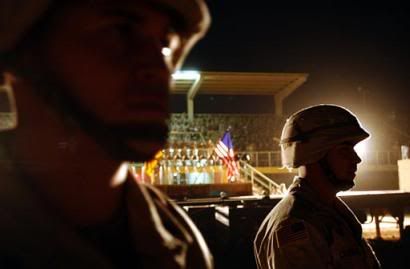
Army Suicide Rate in Combat Zones Elevated
http://usmilitary.about.com/cs/terrorism/a/arsuicide.htm
Unspeakable grief and horror
http://www.thewe.cc/contents/more/archive/circus_2005.html
Iraq Coalition Casualty Statistics/Soldier Suicides
http://www.sourcewatch.org/index.php?title=Iraq_Coalition_Casualty_Statistics/Soldier_Suicides
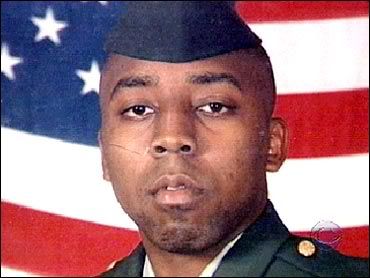
High Suicide Rate For Iraq War GIs
CBS' McNamara Reports On Possible Soldier Suicide Crisis
http://www.cbsnews.com/stories/2004/01/29/eveningnews/main596755.shtml
Texas Army Specialist Joseph Suell told his mother he wasn't cut out to fight the Iraq war.
"He said 'Momma I haven't killed anybody here and I hope I never have to kill anybody,'" said Rena Mathis.
Instead, the 24-year-old husband and father of three apparently took his own life.
"The cause of death is Ibuprofin and amphetamine. Self-inflicted overdose. The Pentagon says self inflicted overdose," said Mathis, reading a military document on her son's death.
As CBS News Correspondent Bob McNamara reports, since the war in Iraq began, 519 American soldiers have died in the line of duty. But there are questions about how many soldiers were suicides.
The Army has not released the findings of a mental-health team that went to Iraq last fall. And some charge the Pentagon is not telling the whole story.
The Pentagon counts at least 22 GI suicides in the Iraq conflict -- 19 of those Army troops -- most after major combat was declared over last May.
"It's statistically too high and it could be as many as 30 -- it could be as many as 30 in Iraq," said Steve Robinson, a retired Army Ranger who is lobbying Congress to pressure the Pentagon to come clean with the true extent of the war's psychiatric toll.
"This has the potential to be a bad news story," he said.
"A bombshell?" asked McNamara.
"I think so," Robinson replied.
"Our leadership is heavily engaged to make sure that we are doing everything possible to take care of even that one soldier that might take his life," said Lt. Gen. James Peake, Army Surgeon General.
But what the Pentagon does not count are stateside soldier suicides. GIs who took their own lives after duty in Iraq. At Walter Reed Army Medical Center two hospitalized Iraq war vets hung themselves.
An army study three years ago forecast an impending soldier-suicide crisis, but critics say it was largely ignored until more than 600 U.S. soldiers began being evacuated from Iraq for psychiatric reasons.
"I tried to blow my head off with my weapon and then one split second more and I would have succeeded," one soldier said. "I mean I had the gun to my head with the safety off, with the round chambered."
McNamara wanted to know, "What saved you?"
"They did, they took the weapon away from me," he answered.
Some blame Lariam, a malaria drug given soldiers and suspected of having suicidal side effects, or that extended duty tours are taxing battle-fatigued troops.
"I can't see anybody going over there cause it;s pure hell. It is hell," said another soldier.
"This place is not for me," wrote Specialist Suell.
Reading her son's last letter helps Rena Mathis make peace with his death.
"I think God just took him away from that battlefield, that's what I think," Mathis said. "I think God just said 'C'mon let's go, it's not for you.'"
But she can not forgive an army she believes could have done more to bring him back alive.
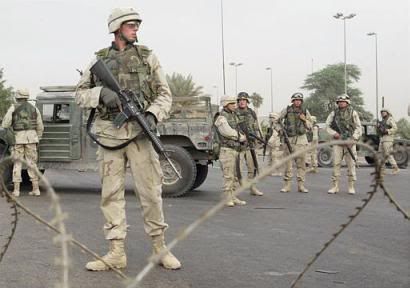
US army shows highest suicide rate among soldiers over 26 years
http://english.pravda.ru/world/americas/16-08-2007/96004-us_army_suicide_rate-0
Ninety-nine U.S. soldiers on active duty killed themselves last year, the highest rate of suicide in the Army in 26 years, a military report said.
One out of four soldiers who committed suicide did so while serving in Iraq or Afghanistan, according to a report scheduled to be released Thursday. Iraq was the most common deployment location for U.S. soldiers who either attempted suicide or committed suicide.
The report, which The Associated Press obtained ahead of its public release, cited 88 suicides in 2005. The 99 recorded in 2006 was the highest raw number since the 102 suicides reported in 1991, the year of the Persian Gulf War when there were more soldiers on active duty.
The suicide rate for the Army has fluctuated over the past 26 years, from last year's high of 17.3 per 100,000 to a low of 9.1 per 100,000 in 2001.
Failed personal relationships, legal and financial problems and the stress of their jobs were factors motivating the soldiers to commit suicide, according to the report. It also found a significant relationship between suicide attempts and the number of days deployed in Iraq, Afghanistan or nearby countries where troops were participating in the war effort.
The 99 suicides included 28 soldiers deployed to the two wars. About twice as many women serving in Iraq and Afghanistan committed suicide as did women not sent to war, the report said.
Preliminary numbers for the first half of 2007 indicate the number of suicides could decline across the service but increase among troops serving in the wars, officials said.
The increases for 2006 came as Army officials worked to set up a number of new and stronger programs for providing mental health care to a force strained by the longer-than-expected war in Iraq and the global counterterrorism war entering its sixth year, the AP reports.
As of June 30, 2007, 44 soldiers had committed suicide, statistics showed. Of those, 17 were deployed away from their home base.
In other years, the report showed:
- 2006: 101 suicides, 30 deployed (17.3 per 100,000)
- 2005: 88 suicides, 25 deployed (12.8 per 100,000)
- 2004: 67 suicides, 13 deployed (10.8 per 100,000)
- 2003: 79 suicides, 26 deployed (12.4 per 100,000)
It is difficult to compare the military suicide rate to that of the private sector because of demographic differences and overall human stress factors, officials say.
In 2006, the overall suicide rate for the United States was 13.4 per 100,000 people. It was 21.1 per 100,000 people for all men aged 17 to 45, compared to a rate of 17.8 for men in the Army.
And it was 5.46 per 100,000 for all women, compared to an Army rate of 11.3 women soldiers per 100,000, CNN reports.
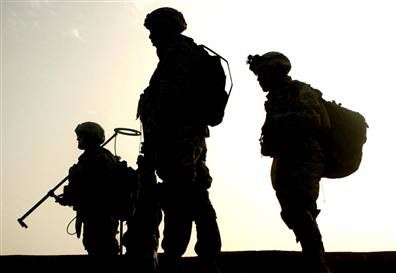
US soldier suicides at highest level for 26 years
http://www.guardian.co.uk/usa/story/0,,2150040,00.html
The number of serving US soldiers who commit suicide has reached its highest level in 26 years, a military report revealed today.
The study - obtained by the Associated Press before its official release - found that more than a quarter of those who killed themselves had done so while on active duty in Iraq or Afghanistan.
A total of 99 suicides among serving US troops were confirmed last year, up from 88 in 2005. The figure equated to 17.3 suicides per 100,000 soldiers, compared with an average of 12.3 per 100,000 over the last 26 years. In 2001, the figure stood at 9.1 per 100,000.
The report said Iraq was "the most common deployment location" for suicides and attempted suicides last year.
The 99 deaths included 28 soldiers who had been deployed to either Iraq or Afghanistan and 71 who had not been sent to the war zones.
Around twice as many women serving in Iraq and Afghanistan committed suicide as women who had not been sent to war, the report said.
Preliminary figures for the first half of this year indicated that the number of troop suicides could decline across the service but increase among soldiers inside war zones during 2007, officials said.
The rise in 2006 came as US army officials worked to set up new initiatives to provide mental health care for a force strained by the longer than expected conflict in Iraq and the global "war on terror", which is now entering its sixth year.
Failed personal relationships, legal and financial problems and the stress of their jobs were all factors in pushing soldiers to suicide, the report concluded.
"In addition, there was a significant relationship between suicide attempts and number of days deployed" in Iraq, Afghanistan or nearby countries in which troops are involved in conflict.
Around a quarter of those who killed themselves had a history of suffering from at least one psychiatric disorder.
Of those, some 20% had been diagnosed with a mood disorder such as bipolar depression, and 8% had been diagnosed with anxiety disorders including post-traumatic stress disorder - a characteristic of the conflict in Iraq.
Firearms were found to be the most common method of suicide. Those who attempted to kill themselves but did not succeed tended more often to take overdoses and cut themselves.
The US army said the research had been compiled from reports collected as part of its suicide prevention programme. The reports are required for all "suicide-related behaviours that result in the death, hospitalisation or evacuation" of a soldier.
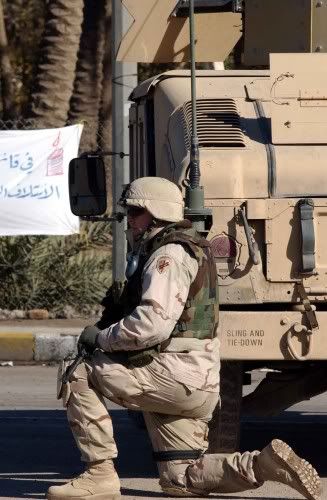
U.S. Army suicides hit highest rate since Gulf War
http://www.reuters.com/article/domesticNews/idUSN1641660320070816
WASHINGTON (Reuters) - The number of suicides in the U.S. Army rose last year to the highest level since the Gulf War, with almost a third in war zones, according to data released by the military on Thursday.
The Army reported 99 confirmed suicides in 2006, up from 87 in 2005. The Army also listed two additional deaths last year as suspected suicides that have not yet been confirmed by the military's medical examiner.
The Army said failed relationships, legal and financial issues, and "occupational/operational issues" led to the suicides.
Viewed in the context of the total population of U.S. soldiers, the Army recorded 17.3 suicides per 100,000 soldiers in 2006, including the two deaths still pending confirmation. That is up from 12.8 suicides per 100,000 soldiers in 2005.
Last year, 30 of the 99 confirmed suicides occurred in war zones, according to the data.
So far this year, 44 soldiers have committed suicide, including 17 in either Iraq or Afghanistan, the Army said.
The number of suicides in 2006 marked the highest level since 1991, the time of the Gulf War, when the Army recorded 102 soldier suicides.
More than 1.5 million U.S. troops have deployed to Iraq and Afghanistan since 2001. The Army, the largest branch of the U.S. military, has been particularly stressed by multiple and extended deployments.
The suicide data follows a string of studies showing an increase in mental health problems among soldiers and other U.S. troops. According to those studies, including a Pentagon assessment, the military has not provided adequate mental health resources to its service members.
According to the latest available data from the U.S. Centers for Disease Control, suicide ranked 11th among the top 15 causes of death in the United States in 2004. The CDC said 1.4 percent of all deaths were a result of suicide.
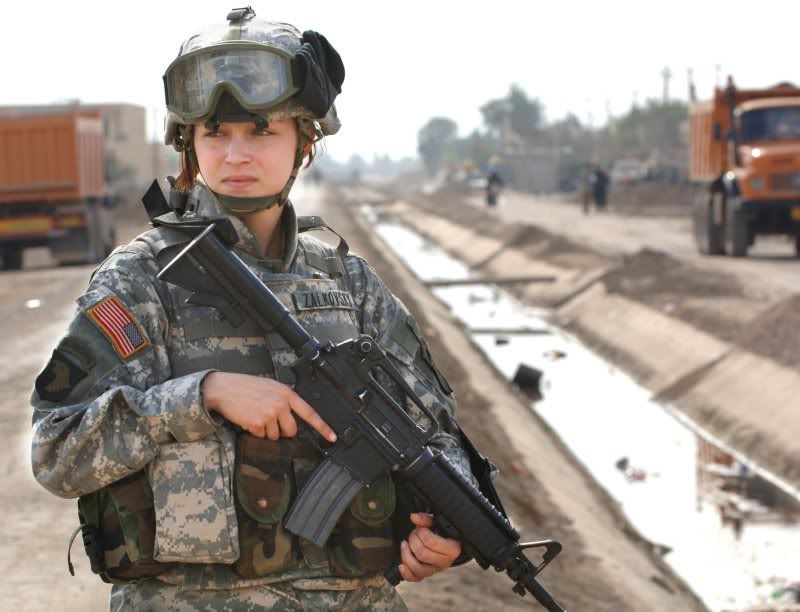
Army suicides hit highest level since 1993
83 soldiers killed themselves in 2005, up from 67 the previous year
http://www.msnbc.msn.com/id/12428185
WASHINGTON - The number of U.S. Army soldiers who took their own lives increased last year to the highest total since 1993, despite a growing effort by the Army to detect and prevent suicides.
In 2005, a total of 83 soldiers committed suicide, compared with 67 in 2004, and 60 in 2003 — the year U.S.-led forces invaded Iraq. Four other deaths in 2005 are being investigated as possible suicides but have not yet been confirmed. The totals include active duty Army soldiers and deployed National Guard and Reserve troops.
“Although we are not alarmed by the slight increase, we do take suicide prevention very seriously,” said Army spokesman Col. Joseph Curtin.
“We have increased the number of combat stress teams, increased suicide prevention and training, and we are working very aggressively to change the culture so that soldiers feel comfortable coming forward with their personal problems in a culture where historically admitting mental health issues was frowned upon,” Curtin said.
Many served in Iraq
Of the confirmed suicides last year, 25 were soldiers deployed to the Iraq and Afghanistan wars — which amounts to 40 percent of the 64 suicides by Army soldiers in Iraq since the conflict began in March 2003.
The suicide rate for the Army has fluctuated over the past 25 years, from a high of 15.8 per 100,000 in 1985 to a low of 9.1 per 100,000 in 2001. Last year it was nearly 13 per 100,000.
The Army recorded 90 suicides in 1993, with a suicide rate of 14.2 per 100,000.
The Army rate is higher than the civilian suicide rate for 2003, which was 10.8 per 100,000, according to the National Centers for Disease Control and Prevention. But the Army number tracked closely with the rate for civilians aged 18-34, which was 12.19 per 100,000 in 2003.
When suicides among soldiers in Iraq spiked in the summer of 2003, the Army put together a mental health assessment team that met with troops. Investigators found common threads in the circumstances of the soldiers who committed suicide — including personal financial problems, failed personal relationships and legal problems.
Army increase prevention efforts
Since then, the Army has increased the number of mental health professionals and placed combat stress teams with units. According to the Army, there are more than 230 mental health practitioners working in Iraq and Afghanistan, compared with “about a handful” when the war began, Curtin said.
Soldiers also get cards and booklets that outline suicide warning signs and how to get help.
But at least one veterans group says it’s not enough.
“These numbers should be a wake-up call on the mental health impact of this war,” said Paul Rieckhoff, executive director of the Iraq and Afghanistan Veterans of America. “One in three soldiers will come back with post traumatic stress disorder or comparable mental health issues, or depression and severe anxiety.”
Rieckhoff, who was a platoon leader in Iraq, said solders there face increased stress because they are often deployed to the warfront several times, they are fighting urban combat and their enemy blends in with the population, making it more difficult to tell friend from foe.
“You don’t get much time to rest and with the increased insurgency, your chances of getting killed or wounded are growing,” he said. “The Army is trying harder, but they’ve got an incredibly long way to go.”
He added that while there are more psychiatrists, the soldiers are still in a war zone, “so you’re just putting your finger in the dam.”
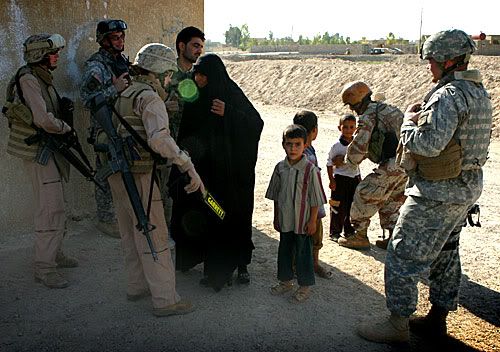
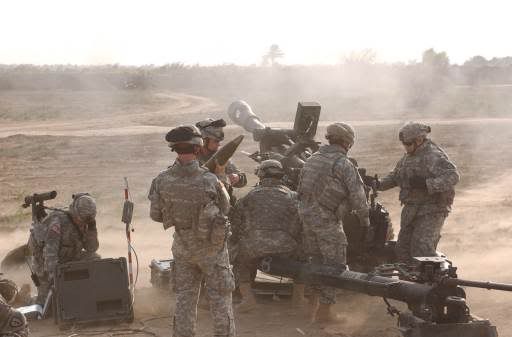
Suicides up among troops; Army concedes need for mental health care
http://www.clarksvilleonline.com/2007/08/15/suicides-up-among-troops-army-concedes-need-for-mental-health-care/
Suicide rates among Army personnel have hit a 26-year high, according to a new report just released by the U.S. Army.
“It’s not surprising,” said Clarksville Therapist Polly Coe as she heard details of the report stating that suicide rates among Army personnel have hit their highest rate in 26 years, with 25% of those self-inflicted deaths occurring in the Afghanistan and Iraq arenas. Iraq led the numbers with the most reported suicides and suicide attempts, according to a report released by the U.S. Army.
I’ve been hearing about it,” Coe said, while voicing a bit optimism that the Army is acknowledging the program and bolstering its metal health treatment efforts for troops worldwide. “They (Army) have to got to face this. Many of these soldiers are facing overwhelming depression and desperately need treatment.” Mental health issues among troops have reached “disastrous” proportions, Coe said, noting that suicides have been occurring not just among enlisted troops but officers as well.
Army officials report 99 confirmed suicides by active duty troops in 2006, significantly higher than the 11 suicides recorded in 2005. The suicide rate is approximately 17.3 per 100,000 troops, up from the previous average of 12.3/100,000. The United States currently has 500,000 troops in active service.
Medical records of these soldiers indicated that at least one-quarter of them had at least one psychiatric disorder, with 20 percent affected by mood disorders, or diagnoses of bipolar disorder and/or depression, anxiety, and post traumatic stress disorder. The latter is the hallmark mental health issue of the Iraq conflict.
According to Polly Coe, a local therapist and one of many providers of mental health services for the Fort Campbell area troops, prolonged deployments, “especially these second and third deployments,” contribute to “family problems” including spouse and child abuse, financial problems, sex addiction, depression, job stress, and divorce.”
Coe is concerned that this third deployment of Fort Campbell troops, who will now serve 15 months instead of twelve overseas in war zones, will result in a sharp increase of psychiatric, psychological and behavioral disorders among enlisted personnel while overseas and when they finally return home.
“They are angry, and that can fuel or be fueled by depression,” Coe said, adding soldiers often dehumanize themselves in battle zones. “It’s a coping mechanism,” she said. “They begin to not show emotion, become like robots who don’t feel anything.” It’s their way of shunting aside pain and rage. But they can’t always turn that off when they come home. They isolate, or they explode, she said.
Coe joins the ranks of other therapists in also voicing concerns about the “dumbing down” of background checks and standards of new recruits in an effort to bolster recruitment numbers, in particular the much reported disregard of some mental health and medication issues which would under other circumstances have kept some military applicants out of the service.
“It’s disastrous,” she said, adding that some of these recruits are already having mental health problems or have been taking medication for such problems. The (structure and training) of the Army will acerbate that, she said. “It’s predictable.”
Coe was pleased that the Army is stepping up and acknowledging publicly that there is an increase in suicide, and increased efforts to address the mental health needs of troops both deployed and at home bases. “It’s a start.”
Army officials admitted to a “significant” relationship between suicides and suicide attempts and the length of deployment in Iraq, Afghanistan and bases in the region where troops are involved in the war effort. The conceded that there was “limited evidence” of a correlation between multiple deployments and suicide. Although preliminary numbers for 2007 currently show a decline among armed forces as a whole, there is an increase of suicide among deployed troops. Twice as many servicewomen deployed to war zones committed suicide compared to those stateside or in non-combat areas. Firearms were the method of choice among most suicides, while those who attempted to end their lives but failed more often when attempting to overdose or cut themselves.
In the wake of both public opinion and a demonstrated need for services by troops and their families, the Army has attempted to create a larger number of programs and expand mental health services to alleviate the stress created by a seemingly endless war, a battle now entering its sixth year.
In prior interviews with Clarksville Online, Coe said that therapists across the region are having a hard time keeping up with the numbers of troops and their families who need help coping with both deployments and the return of their loved ones.
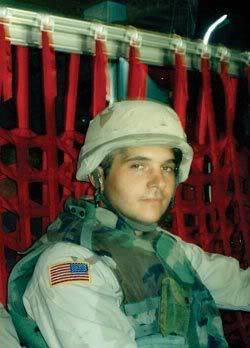
'We Were Torturing People For No Reason' -- A Soldier's Tale
http://www.alternet.org/asoldierspeaks/49813/
Interrogator Tony Lagouranis says he discovered and indulged in his own evil at Abu Ghraib prison, and now fears that it will be his constant companion for the rest of his life.
The Torturer's Toll
Tony Lagouranis is a 37-year-old bouncer at a bar in Chicago's Humboldt Park. He is also a former torturer. That was how he was described in an email promoting a panel discussion, "24: Torture Televised," hosted by the NYU School of Law's Center on Law and Security in New York on March 21. And he doesn't shy away from the description.
As a specialist in a military intelligence battalion, Lagouranis interrogated prisoners at Abu Ghraib, Al Asad Airfield, and other places in Iraq from January through December 2004. Coercive techniques, including the use of military dogs, waterboarding, and prolonged stress positions, were employed on the detainees, he says. Prisoners held at Al Asad Airfield, which is located approximately 110 miles northwest of Baghdad, were shackled and hung from an upright bed frame "welded to the wall" in a room in an airplane hanger, he told me in a phone interview after the NYU event. When he was having problems getting information from a detainee, he recalls, the other interrogators said, "Chain him up on the bed frame and then he'll talk to you." (Lagouranis says he didn't participate directly in hangings from the frames.)
The results of the hangings, shacklings, and prolonged stress positions -- sometimes for hours -- were devastating. "You take a healthy guy and you turn him into a cripple -- at least for a period of time," Lagouranis tells me. "I don't care what Alberto Gonzales says. That's torture."
Lagouranis was on the NYU panel -- along with Jane Mayer, a New Yorker staff writer; Stephen Holmes, an NYU School of Law professor and author of an upcoming book, The Matador's Cape: America's Reckless Response to Terror; Jill Savitt, director of public programs for Human Rights First; and Wesleyan University professor Richard Slotkin -- to talk about torture and its role in the Emmy-Award-winning 24.
The show's hero, Jack Bauer (Kiefer Sutherland), is famously ruthless in his attempts to extract information about terrorist plots from suspects in "ticking timebomb" situations. The prevailing sentiment of the show, as Mayer wrote in her February 19 New Yorker article about 24, is, "Whatever it takes." Lagouranis met with the show's creative team in California in November, she wrote. He told them that the grisly plotlines of television shows like 24 had given soldiers ideas on how to torment prisoners (for example, forcing a prisoner to listen to the sounds of men being tortured in a nearby cell -- a method that was proposed, he said, but not carried out during his time in Iraq).
The violence on 24 is horrific and almost cartoon-like in its depiction. Yet the show does have a moral conscience. One of the themes, as lead writer Howard Gordon told Mayer, is that Jack Bauer suffers over the violence he is forced to inflict on men and women in the name of national security. "Jack is basically damned," Gordon told Mayer.
Jack Bauer is, of course, a fictional character. Lagouranis, meanwhile, has seen the suffering of people who have been interrogated in Iraq. Their pain is muted in comparison to the ordeal that 24 suspects have endured. The Iraqi prisoners were not electrocuted or attacked with knives, as Mayer wrote about the terrorism suspects in 24. And Lagouranis may not be, in Hollywood discourse, "damned." But he is in a state of mind that could be described as -- at the very least -- uneasy.
Lagouranis is one of the few individuals to have spoken publicly about his experiences as an interrogator who used or saw harsh techniques inflicted on prisoners in the war. His book, Fear Up Harsh: An Army Interrogator's Dark Journey through Iraq, co-authored by Allen Mikaelian, will be published in June. But he is hardly the only one familiar with the stories. It is hard to know how many men and women have witnessed acts of detainee abuse or participated in the use of coercive interrogation methods that appear to violate international law during the Iraq war. At least nine individuals, including Lynndie R. England and her former boyfriend Charles A. Graner Jr., have been sentenced to prison for detainee-related offenses at Abu Ghraib. Others may someday face prosecution for alleged crimes and detainee abuse in the Iraq war.
Lagouranis reported the detainee abuses that he witnessed in Iraq and is not a suspect in detainee-related abuses. As he says, he followed military guidelines during interrogations. "The things I participated in were technically legal," he explains. Yet there have been repercussions. He suffered from panic attacks after his return to the United States and was placed under army psychiatric care. He received an honorable discharge from the army in July 2005.
Lagouranis studied ancient Greek at St. John's College in Santa Fe, New Mexico, and he learned Arabic at the Defense Language Institute in Monterey, California. As he explained in his book and in conversations with me, he is familiar with classical and modern texts about warfare and the Middle East as well as with international law that protects the rights of prisoners of war.
He and other soldiers discussed the Geneva Conventions during military training at Fort Gordon, Georgia, in 2003, before being deployed to Iraq. But it became clear they were not always expected to abide by them, he says. Some of the soldiers and officers had been influenced by Mark Bowden's October 2003 Atlantic Monthly article, "The Dark Art of Interrogation," which describes techniques that, in the author's words, are "excruciating for the victim" yet "leave no permanent marks and do no lasting physical harm."
"It seems to me Bowden was advocating what he calls 'torture lite,'" Lagouranis tells me. "That made an impression on a lot of people. The feeling was that what we had been taught about the Geneva Conventions was not going to be followed anymore. We would be following a new set of rules -- and that was what Bowden was talking about."
Things seemed different in Iraq. "I started realizing that most of the prisoners were innocent," Lagouranis says. "We were torturing people for no reason. I started getting really angry and really remorseful and by the time I got back I completely broke down."
Maybe that was a normal reaction, I tell him.
"That's what my shrink told me," he says. "I can just say that people don't fully realize that for a person to do that to another human being -- it definitely takes a toll."
Back during the NYU event, Lagouranis had sat behind a long table on a stage with his sleeves rolled up and his arms folded across his chest. Toward the end of the discussion, he leaned forward and told the audience that, ultimately, the abuse of prisoners could not be blamed on shows like 24. "I'm from New York City. I'm college-educated," he said. "But you put me in Iraq and told me to torture, and I did it and I regretted it later."
It is clear that he and others like him will be dealing with the fallout from the war, especially those aspects that have been hidden from public view, for a long time. "I didn't know I would discover and indulge in my own evil," he writes in his forthcoming book. "And now that it has surfaced, I fear that it will be my constant companion for the rest of my life."
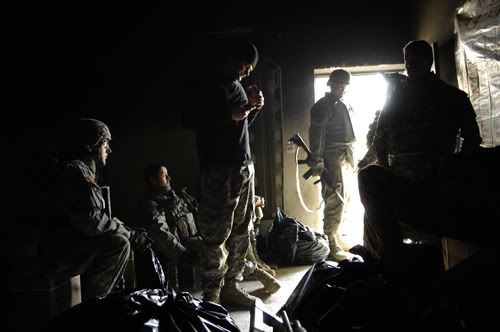
Fallen Soldier Lost to Suicide
Decorated Soldier Ignored by VA Commits Suicide
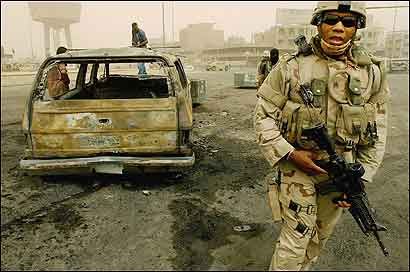
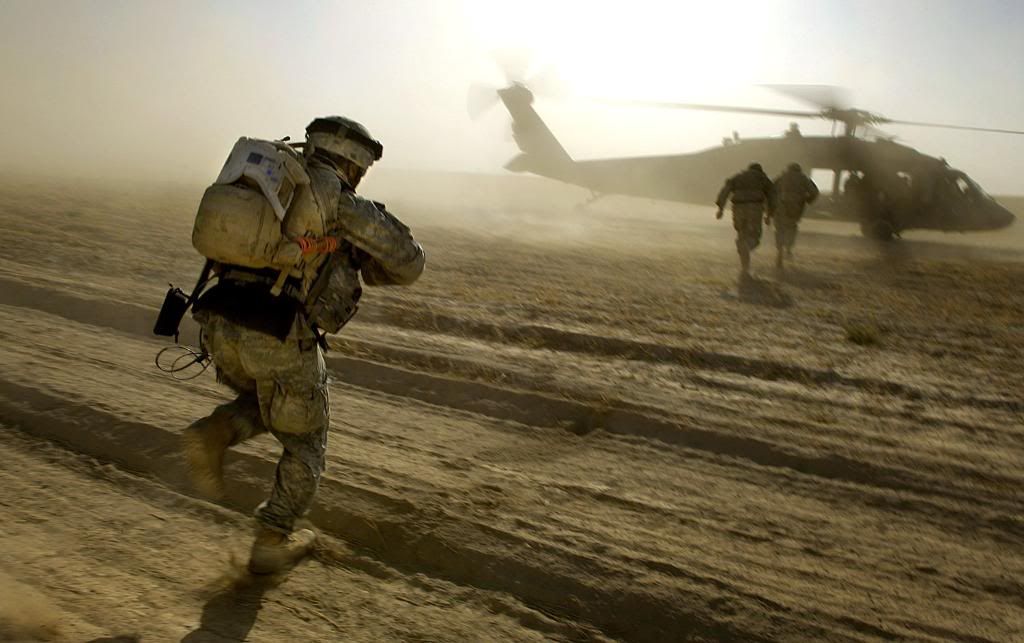












![Brotherhood" (2006) [TV-Series]](http://photos1.blogger.com/x/blogger2/1421/379621144723082/211/z/425926/gse_multipart33129.jpg)







No comments:
Post a Comment